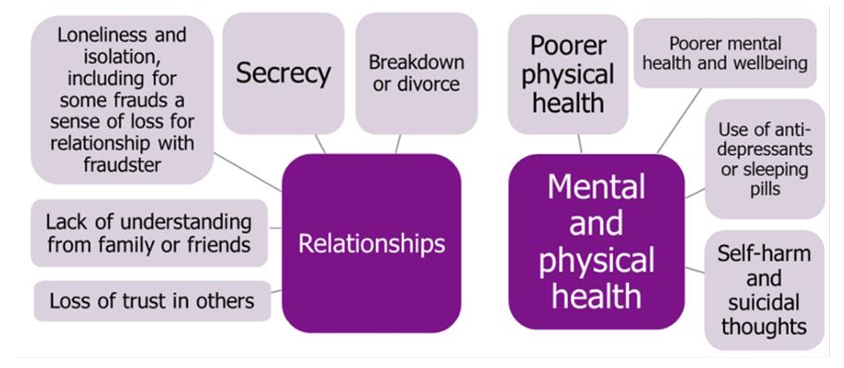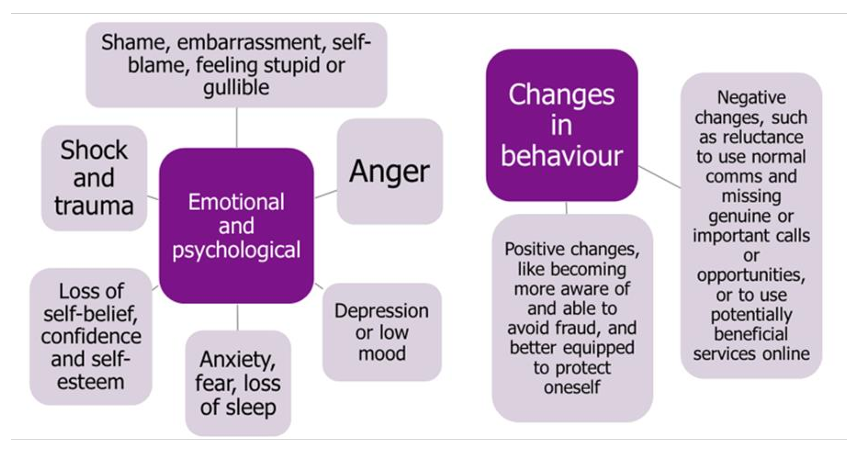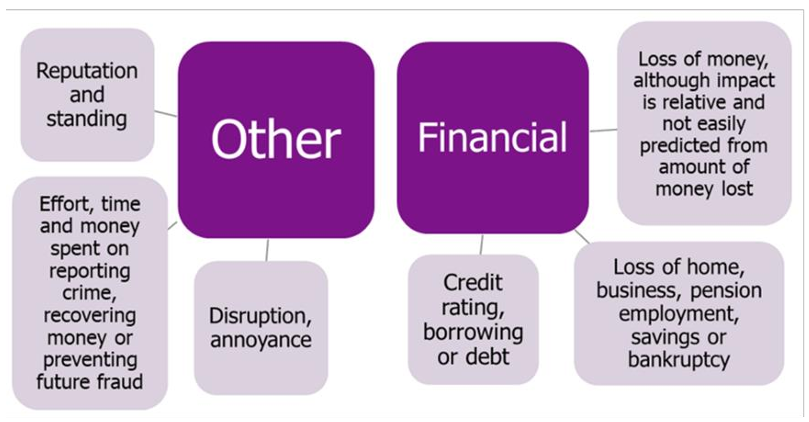UK Government: Social and Psychological Implications of Fraud
Psychology of Scams
Authors:
• UK Parliament – Government of the United Kingdom
• SCARS Editorial Team – Society of Citizens Against Relationship Scams Inc.
About This Article
Fraud poses a significant threat to the UK, with 4 in 10 offences targeting individuals. The government’s 2023 Fraud Strategy aims to combat this, emphasizing victim support and prevention.
While stereotypes of elderly victims persist, fraud risks vary due to psychological and social factors. Beyond financial loss, fraud inflicts emotional and psychological harm.
Victims often report fraud to banks rather than authorities. Effective prevention strategies involve education and enhanced victim care. This POSTnote underscores the multifaceted nature of fraud and the need for comprehensive, collaborative approaches to mitigate its impact on individuals in England and Wales.

UK Government: Social and Psychological Implications of Fraud
The Complex UK Challenges of Fraud Against Individuals in the United Kingdom: Insights and Strategies for Prevention
An Analysis of the Psychology and Sociology of Scams & Fraud
The UK Government has acknowledged fraud as a “significant threat to the people, prosperity and security of the UK”.
In 2023, fraud was the most common offence against individuals.
There are many different types of fraud against individuals, such as bank and credit account frauds or purchase frauds. Government and stakeholders have highlighted particular concerns about ‘authorised push payment’ (APP) frauds, where fraudsters trick victims into making payments or sharing information like account details. These often involve ‘social engineering’, where fraudsters create a direct relationship with victims to manipulate them.
Government, law enforcement, private sector and third sector bodies are involved in the response to fraud against individuals. Following rises in fraud during the Covid-19 pandemic, since 2023, there has been a renewed government focus on addressing fraud and its impacts. The cross-sector Home Office-led Fraud Strategy aims to reduce fraud by 10% from 2019 levels by December 2024. It includes specific aims to improve victim support; reimburse more victims; and improve communications. Other policy developments include the Online Safety Act 2023 and the Online Fraud Charter.
This POSTnote focuses on fraud against individuals, although fraud can also occur against public sector, commercial and charitable bodies. It applies to England and Wales; legal, policing and criminal justice approaches to fraud may differ in the other nations of the UK.
Key points
- Fraud accounts for 4 in 10 offences against individuals. 6% of adults were a victim of fraud in 2023. There are many types of fraud, such as purchase or romance frauds. Fraud changes quickly and much is cyber-related.
- The UK Government’s 2023 Fraud Strategy includes aims to improve victim support, reimburse more victims and improve communications. It also seeks to prevent more frauds from taking place. This will involve actions by government, law enforcement, the private sector, and individuals.
- The stereotype of elderly fraud victims is inaccurate compared to observed fraud risks. Psychological and social factors may affect risk, for example, individual personalities, circumstances, or market-related vulnerabilities, such as demand for rental accommodation.
- In addition to financial loss, fraud can cause emotional, psychological and health impacts, and can harm people’s relationships. Impacts may vary for individual victims, and by different fraud characteristics.
- Victims are most likely to report fraud to their bank or account provider, rather than the national reporting service Action Fraud or police.
- The published evidence base for fraud against individuals is limited. However, academics and practitioners suggest several areas to consider in implementing effective fraud prevention, including education, and victim care.
Psychological & Social Impact on Fraud Victims
UK Parliament Post Report: Social and psychological implications of fraud
Please Rate This Article
Please Leave Us Your Comment
Also, tell us of any topics we might have missed.
Thank you for your comment. You may receive an email to follow up. We never share your data with marketers.
-/ 30 /-
What do you think about this?
Please share your thoughts in a comment above!
-/ 30 /-
What do you think about this?
Please share your thoughts in a comment above!
SCARS LINKS: AgainstScams.org RomanceScamsNOW.com ContraEstafas.org ScammerPhotos.com Anyscam.com ScamsNOW.com
reporting.AgainstScams.org support.AgainstScams.org membership.AgainstScams.org donate.AgainstScams.org shop.AgainstScams.org
youtube.AgainstScams.org linkedin.AgainstScams.org facebook.AgainstScams.org
ARTICLE RATING
TABLE OF CONTENTS
CATEGORIES
MOST POPULAR COMMENTED ARTICLES
POPULAR ARTICLES
U.S. & Canada Suicide Lifeline 988
![NavyLogo@4x-81[1]](https://scamsnow.com/wp-content/uploads/2025/04/NavyLogo@4x-811.png)
ARTICLE META
WHAT PEOPLE ARE TALKING ABOUT LATEST SITE COMMENTS
See Comments for this Article at the Bottom of the Page
on Transference And Emotional Danger After The Scam – 2024: “Thank you for the kind but firm reminder that the person in the stolen profile photo has their own life.…” Jul 9, 01:26
on ‘Mental Defeat’ – The Unique Condition Of Giving Up – 2024: “Thank you for another great article. I can see from this article that mental defeat would be debilitating to a…” Jul 9, 00:49
on Trust: Romance Scams Betrayal And Scam Victims – 2024: “This provided valuable insight that I can identify with” Jul 8, 16:44
on A Scam Victim in Extreme Distress – Stopping the Pain – 2024: “Your trust issues are very understandable. We are very sorry this happened to you. We suggest that you contact an…” Jul 8, 14:42
on A Scam Victim in Extreme Distress – Stopping the Pain – 2024: “My online counselors advised me to check myself in. I went to the hospital because I was suicidal. After I…” Jul 8, 13:44
on Scam Victim Catastrophizing Making Recovery Difficult 2024: “Excellent article on catastrophizing. I can understand how this could take a person down a rabbit warren of never ending…” Jul 8, 12:12
on The Self-Pity Trap & How To Overcome It – 2023 – [UPDATED 2025]: “I am not in the habit of feeling sorry for myself. After the deception, although it was not easy at…” Jul 8, 11:49
on Pride – A Dual Edged Sword For Scam Victims – 2023 [UPDATD 2024]: “Looking back over my life I have seen how pride has impacted me both positively and negatively. However the negative…” Jul 8, 09:08
on The Self-Pity Trap & How To Overcome It – 2023 – [UPDATED 2025]: “I felt self-pity while the enormity of my financial loss washed over me like a tsunami. The self-pity lasted only…” Jul 7, 18:55
on The Uniqueness Of Scam Victims Or Fraud Victims – 2024: “unfortunately all true. It is highly stressful dealing with the aftermath. I am being sued for the money I borrowed…” Jul 6, 12:50
on Scam Victims & Mental Health Blaming – 2023 [UPDATED 2025]: “For most of my life words have defeated me, made me feel insignificant, unwanted, unneeded. For this reason it is…” Jul 5, 13:36
on Substance Abuse Susceptibility And Scam Victims – 2024: “It is understandable how some would feel that alcohol or substance abuse would be helpful in handling their feelings after…” Jul 1, 20:36
on Scam Victims Use Work To Avoid Healing: “The last 6 years have been the most difficult of my life. The pandemic, having both parents in the hospital…” Jun 29, 18:38
on Entitlement Mentality And How Scam Victims Often Lose Their Path To Recovery – 2024: “Thank you for this discussion of entitlement. I can see from the descriptions listed that I have not felt entitlement.…” Jun 29, 18:22
on Samurai Wisdom and Rituals for Clearing the Mind After Scam Trauma – 2025 – [VIDEOS]: “A great guide on how to move forward in our recovery process with a calm mind, cleansed on an ongoing…” Jun 28, 07:34
on Delayed Gratification and Patience in Scam Victim Recovery – 2025 – [VIDEOS]: “We want to recover quickly and… we make new mistakes. How not to speed up the recovery process, how to…” Jun 28, 06:41
on The Unique Injury Of Betrayal Trauma On Scam Victims – 2024: “Primarily because you did not see it coming” Jun 27, 23:57
on Changes In A Scam Victim’s Life: “I really detest the way my trust in others has been affected by the scamming I went through. I used…” Jun 27, 14:47
on The Unique Injury Of Betrayal Trauma On Scam Victims – 2024: “Betrayal Trauma is the worst feeling ever. Why does it seem so much worse when a scammer does that to…” Jun 27, 14:34
Important Information for New Scam Victims
Please visit www.ScamVictimsSupport.org – a SCARS Website for New Scam Victims & Sextortion Victims
SCARS Institute now offers a free recovery program at www.SCARSeducation.org
Please visit www.ScamPsychology.org – to more fully understand the psychological concepts involved in scams and scam victim recovery
If you are looking for local trauma counselors, please visit counseling.AgainstScams.org
If you need to speak with someone now, you can dial 988 or find phone numbers for crisis hotlines all around the world here: www.opencounseling.com/suicide-hotlines
Statement About Victim Blaming
Some of our articles discuss various aspects of victims. This is both about better understanding victims (the science of victimology) and their behaviors and psychology. This helps us to educate victims/survivors about why these crimes happened and not to blame themselves, better develop recovery programs, and help victims avoid scams in the future. At times, this may sound like blaming the victim, but it does not blame scam victims; we are simply explaining the hows and whys of the experience victims have.
These articles, about the Psychology of Scams or Victim Psychology – meaning that all humans have psychological or cognitive characteristics in common that can either be exploited or work against us – help us all to understand the unique challenges victims face before, during, and after scams, fraud, or cybercrimes. These sometimes talk about some of the vulnerabilities the scammers exploit. Victims rarely have control of them or are even aware of them, until something like a scam happens, and then they can learn how their mind works and how to overcome these mechanisms.
Articles like these help victims and others understand these processes and how to help prevent them from being exploited again or to help them recover more easily by understanding their post-scam behaviors. Learn more about the Psychology of Scams at www.ScamPsychology.org
SCARS INSTITUTE RESOURCES:
If You Have Been Victimized By A Scam Or Cybercrime
♦ If you are a victim of scams, go to www.ScamVictimsSupport.org for real knowledge and help
♦ Enroll in SCARS Scam Survivor’s School now at www.SCARSeducation.org
♦ To report criminals, visit https://reporting.AgainstScams.org – we will NEVER give your data to money recovery companies like some do!
♦ Follow us and find our podcasts, webinars, and helpful videos on YouTube: https://www.youtube.com/@RomancescamsNowcom
♦ Learn about the Psychology of Scams at www.ScamPsychology.org
♦ Dig deeper into the reality of scams, fraud, and cybercrime at www.ScamsNOW.com and www.RomanceScamsNOW.com
♦ Scam Survivor’s Stories: www.ScamSurvivorStories.org
♦ For Scam Victim Advocates visit www.ScamVictimsAdvocates.org
♦ See more scammer photos on www.ScammerPhotos.com
You can also find the SCARS Institute on Facebook, Instagram, X, LinkedIn, and TruthSocial
Psychology Disclaimer:
All articles about psychology and the human brain on this website are for information & education only
The information provided in this and other SCARS articles are intended for educational and self-help purposes only and should not be construed as a substitute for professional therapy or counseling.
Note about Mindfulness: Mindfulness practices have the potential to create psychological distress for some individuals. Please consult a mental health professional or experienced meditation instructor for guidance should you encounter difficulties.
While any self-help techniques outlined herein may be beneficial for scam victims seeking to recover from their experience and move towards recovery, it is important to consult with a qualified mental health professional before initiating any course of action. Each individual’s experience and needs are unique, and what works for one person may not be suitable for another.
Additionally, any approach may not be appropriate for individuals with certain pre-existing mental health conditions or trauma histories. It is advisable to seek guidance from a licensed therapist or counselor who can provide personalized support, guidance, and treatment tailored to your specific needs.
If you are experiencing significant distress or emotional difficulties related to a scam or other traumatic event, please consult your doctor or mental health provider for appropriate care and support.
Also read our SCARS Institute Statement about Professional Care for Scam Victims – click here
If you are in crisis, feeling desperate, or in despair, please call 988 or your local crisis hotline.
More ScamsNOW.com Articles
A Question of Trust
At the SCARS Institute, we invite you to do your own research on the topics we speak about and publish. Our team investigates the subject being discussed, especially when it comes to understanding the scam victims-survivors’ experience. You can do Google searches, but in many cases, you will have to wade through scientific papers and studies. However, remember that biases and perspectives matter and influence the outcome. Regardless, we encourage you to explore these topics as thoroughly as you can for your own awareness.



















![scars-institute[1]](https://scamsnow.com/wp-content/uploads/2025/04/scars-institute1.png)
![niprc1.png1_-150×1501-1[1]](https://scamsnow.com/wp-content/uploads/2025/04/niprc1.png1_-150x1501-11.webp)

Leave a Reply